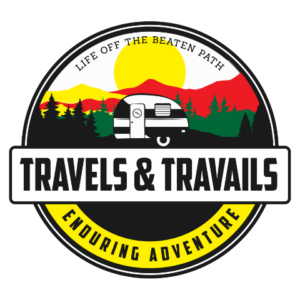Having grown up camping, I never think of it as a stressful activity. But when you have an anxious dog, you know that many new things can be stressful. Even if your dog isn’t anxious, new things that aren’t stressful to you can be stressful for your dog. So this begs the question, “Is camping stressful for dogs?”
Camping can be stressful for dogs, especially timid dogs. Some dogs love spending time in nature, exploring new sights and smells, and being with their owners, while others may find the experience overwhelming or frightening.
In this article, we’ll discuss the causes of stress in dogs when camping. I’ll also give you some tips to help your dog become more comfortable camping.
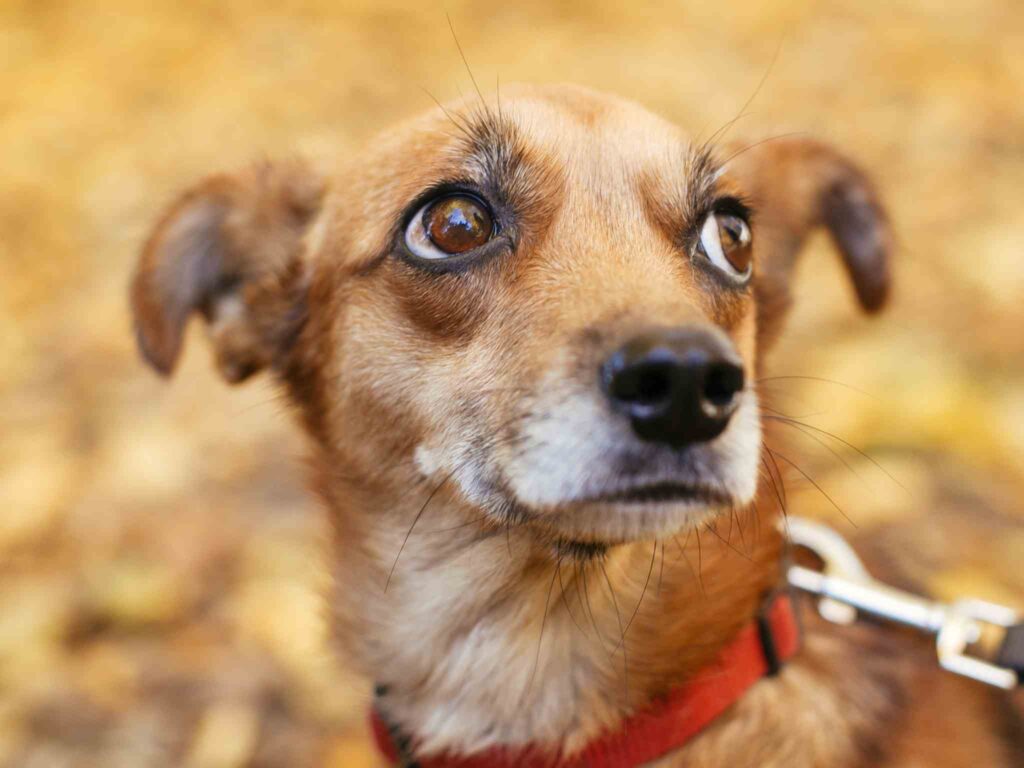
Factors that can contribute to stress in dogs while camping
Dogs can get stressed while camping due to new surroundings, loud noises like wild animals or people, and changes in routine.
If they’re not used to being outdoors or with new stimuli, dogs can become anxious. New environments can be overwhelming with strange sights, smells, and sounds.
Dogs may exhibit nervous behavior or even try to escape, leading to a stressful trip.
Unfamiliar surroundings as a stressor
When camping with your dog, unfamiliar surroundings can be a significant source of stress for them. Your dog may feel anxious and uncertain in a new environment.
This anxiety can cause behavioral changes such as nervousness, excessive barking, or even attempts to escape. This can be stressful for you and potentially ruin your trip.
Dogs are creatures of habit and routine, so sudden changes in their surroundings can be unsettling. The unfamiliar smells, sights, and sounds of a new location can be overwhelming. This makes it difficult for your dog to relax and feel comfortable.
To help your dog feel at ease, gradually introducing them to new environments is important. In addition, use positive reinforcement to minimize their stress and ensure a positive experience.
Stressful noises such as wildlife or other campers
Noise, such as wildlife or other campers, can also contribute to your dog’s stress. Dogs have keen senses and can be easily startled or overwhelmed by unfamiliar sounds.
The sounds of other dogs barking, people talking, or wildlife moving around can be particularly unsettling for dogs, especially if they’re used to a quieter environment.
Loud or sudden noises may cause fear or anxiety in dogs. This can lead to shaking, hiding, or excessive barking.
To help your dog feel more comfortable in a noisy camping environment, bring along familiar items, such as their favorite toys or blankets, or provide a safe and secure place to retreat to when feeling overwhelmed.
To help with this, I wrote an article on how to keep your dog comfortable when camping.
Changes in routine as a stressor
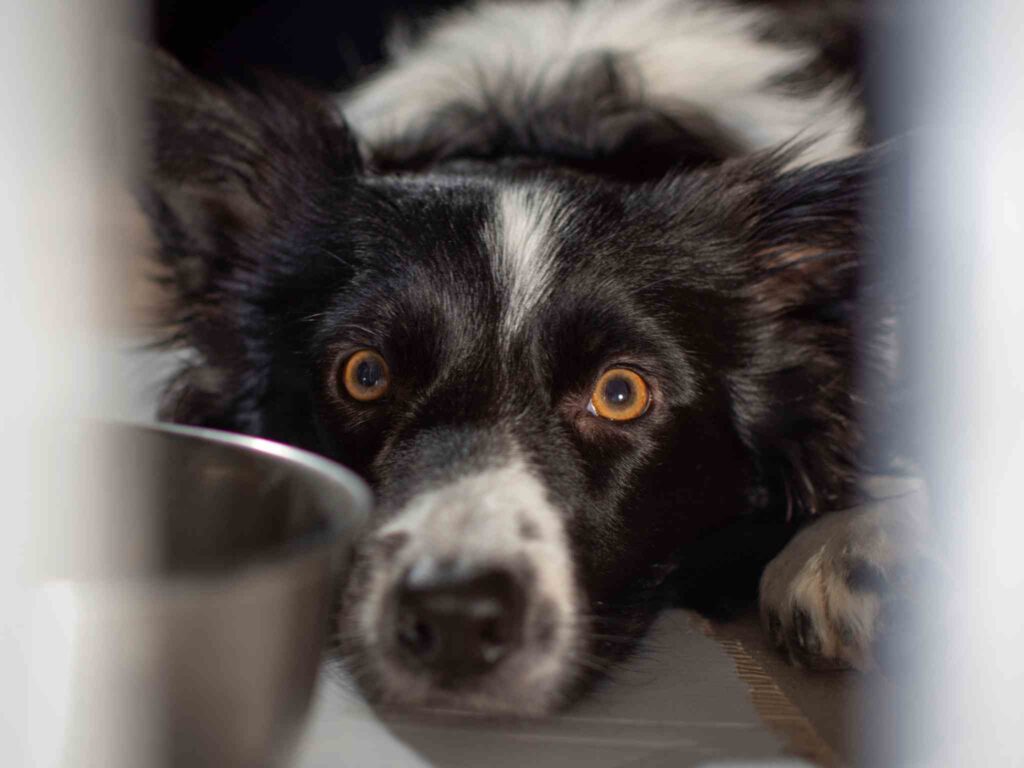
Another stressor can be changes in your dog’s routine. Like people, dogs thrive on routine and predictability. A sudden change in their daily schedule can be unsettling.
This includes changes to feeding times, exercise routines, or sleeping arrangements. Your dog may become anxious or confused if their routine is disrupted, which can lead to behavioral changes such as restlessness or agitation.
To help your dog adjust to changes in routine while camping, try to maintain as much consistency as possible.
Stick to regular feeding times, exercise routines, and sleeping arrangements. Provide plenty of positive reinforcement and reassurance to help your dog feel secure and at ease.
Lack of exposure to certain stimuli contributes to stressful situations
While camping, your dog may also experience stress due to a lack of exposure to certain stimuli.
For example, if your dog is used to spending most of their time indoors or in a fenced yard, they may feel anxious or overwhelmed by the open spaces and new sights and smells of a camping environment.
On the other hand, if your dog is used to being outdoors and active, they may become bored or restless. This can happen if they’re confined to a small camping area or are not given enough opportunities to exercise and explore.
To help your dog adjust to the new stimuli of a camping environment, gradually introduce them to new sights, sounds, and smells. In addition, provide plenty of opportunities for exercise and play.
This will help your dog feel more comfortable and relaxed while camping.
How to prepare your dog for a camping trip
It’s important to prepare your dog for a camping trip gradually.
Gradually expose your dog to new experiences and environments
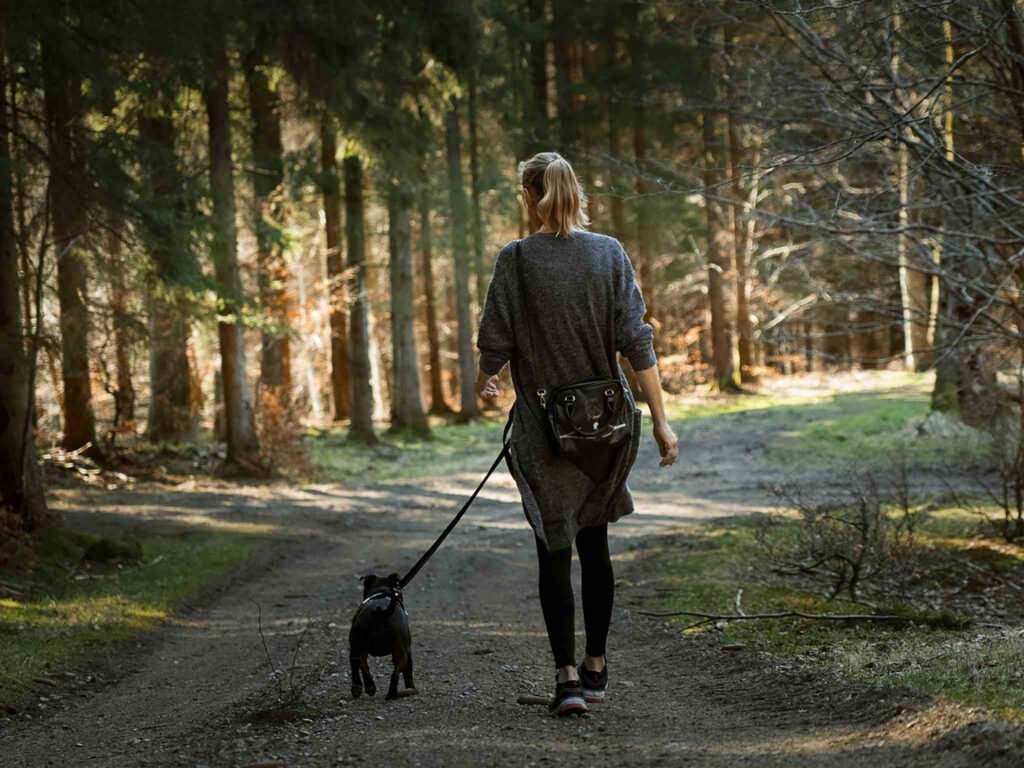
Gradually exposing your dog to new experiences and environments can help reduce their stress while camping.
Introduce your dog to new stimuli gradually, starting with short sessions and gradually increasing the duration and intensity. For example, if your dog has never been camping before, take them on short walks around the camping area to familiarize them with the sights and smells.
As they become more comfortable, gradually increase the length and difficulty of the walks.
This will help your dog build confidence and reduce their anxiety about new experiences.
Remember to provide plenty of positive reinforcement and reward your dog for good behavior to help them associate new experiences with positive outcomes.
Practice setting up and spending time in your tent or RV
To help your dog feel more comfortable in your tent or RV, practice setting them up and spending time before your camping trip. This can help your dog feel more comfortable while camping. Dogs thrive on routine, so spending time in a familiar environment can help reduce their stress.
Set up your tent or RV in your backyard or a local park, and spend time in it with your dog. This will help them get used to the new environment and familiarize themselves with the sights and smells.
Practice sleeping with your dog in your tent or RV overnight, so they become comfortable with the nighttime sounds and movements.
Doing this will help your dog feel more at ease while camping. It will also make the experience more enjoyable for both you and your furry friend.
Monitor your dog’s behavior and provide reassurance and positive reinforcement.
Monitor your dog’s behavior and provide reassurance and positive reinforcement. This will help reduce their stress while camping.
Pay attention to your dog’s body language and behavior, and intervene if you notice signs of anxiety or stress.
Provide reassurance and comfort, and use positive reinforcement to reward good behavior. For example, if your dog remains calm in a noisy campground, reward them with a treat or verbal praise.
Avoid punishing or scolding your dog for exhibiting stress-related behaviors, as this can exacerbate their anxiety. Instead, focus on providing positive experiences and reinforcing calm behavior to help your dog feel safe and secure while camping.
Tips for making your dog comfortable while camping
Making the environment more comfortable and familiar for your dog will help reduce stress. Here are a few tips to help make your dog more comfortable.
Provide a safe and comfortable place for your dog to sleep
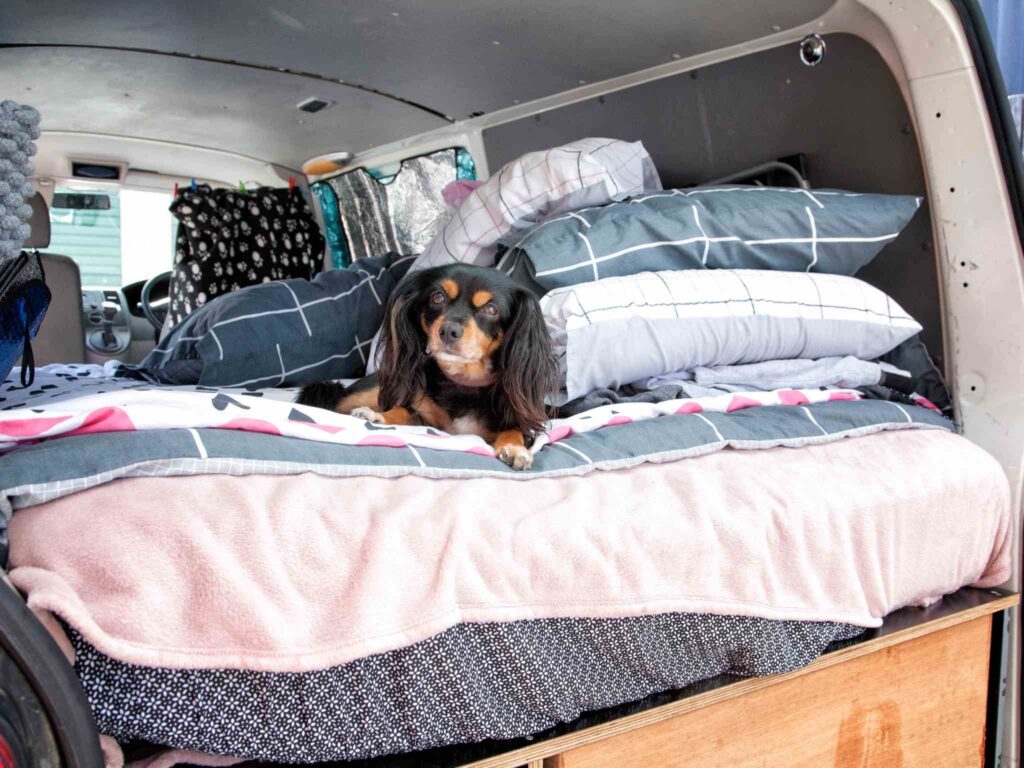
Providing a safe and comfortable place for your dog to sleep is crucial to their comfort and well-being while camping.
Ensure your dog has a soft, comfortable bed or blanket to sleep on and provide a designated space for them to rest. As much as possible, try to recreate your dog’s home environment.
This will help them feel safe and protected and give them a familiar place to retreat if they feel overwhelmed. If you’re camping in an RV, make sure your dog has a designated area to sleep in that is free from hazards and comfortable for them.
By providing a safe and comfortable sleeping area, you can help your dog feel more at ease and enjoy their camping experience to the fullest.
Consider bringing a crate or playpen for your dog to have a safe and secure space
Consider bringing a crate or playpen for your dog to have a safe and secure space while camping.
This can help your dog feel more comfortable and provide a designated area to retreat to when feeling overwhelmed or anxious.
A crate or playpen can also be used as a space for your dog to sleep at night or to keep them contained while you’re away from your campsite.
Make sure to introduce your dog to their new space gradually and with positive reinforcement, and never use the crate or playpen as a form of punishment.
Providing a safe and secure space for your dog can help minimize their stress and ensure a positive camping experience for everyone.
Bring familiar items such as their bed, toys, and favorite treats
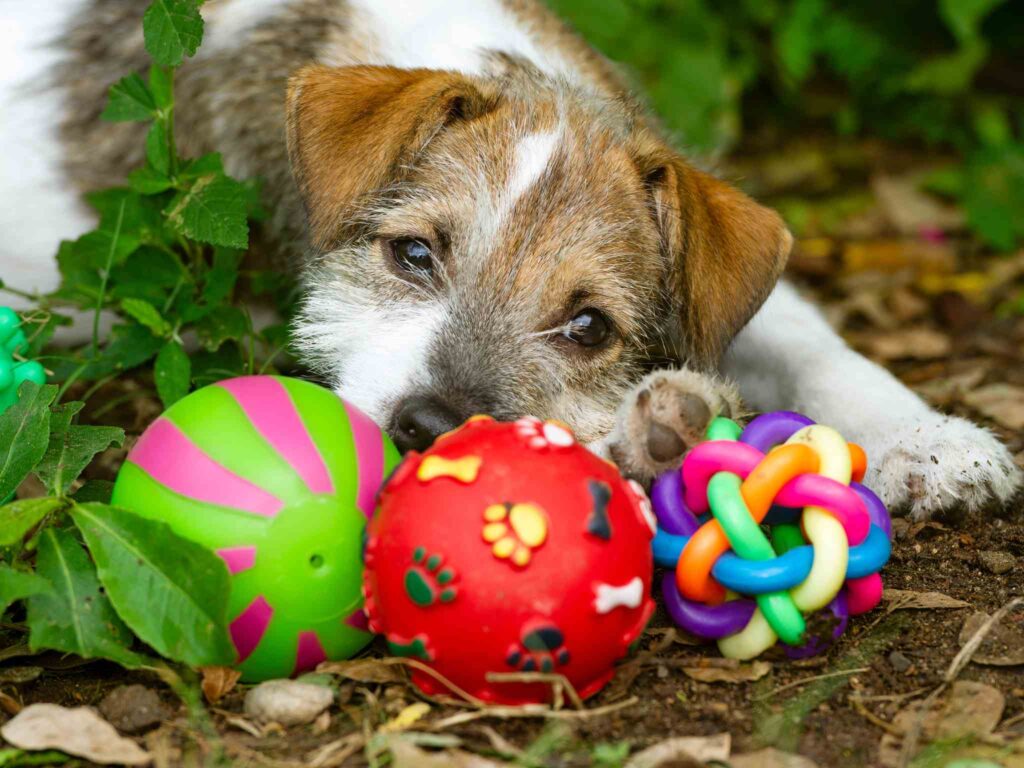
Bringing familiar items such as your dog’s bed, toys, and favorite treats can help them feel more comfortable and secure while camping. These items will provide a sense of familiarity and help your dog feel more at home in a new environment.
Pack your dog’s favorite toys and treats to keep them entertained and happy, and make sure they have a comfortable bed or blanket to sleep on.
If your dog has a favorite item, such as a blanket or stuffed animal, bring it along to provide additional comfort and reassurance.
By bringing familiar items, you can help minimize your dog’s stress and ensure a positive camping experience for both you and your furry companion.
Here are some other articles that we wrote about camping with dogs:
Snow Dogs: 20 Best Breeds for Winter Camping Adventures
Pawsitively Toasty: Keeping Your Dog Warm and Safe in a Tent
Doggone Fun: 10 of California’s Best Dog-Friendly Camping Spots
Camping Courtesy: Silencing Your Barking Dog at the Campsite
Conclusion
Camping with your furry companion can be a fun and rewarding experience, but it’s important to keep in mind the potential stressors that may affect your dog. Remember to always prioritize your dog’s safety and well-being while camping and enjoy the great outdoors with your furry friend.
